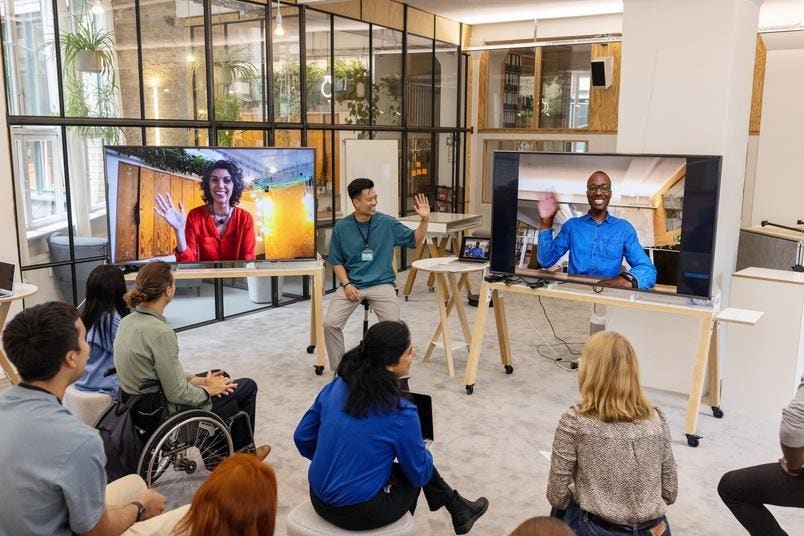CEO of DeskTime—a time tracking and productivity app for companies and freelancers. He’s also an amateur athlete and father of two.
The lasting impact of the pandemic is that remote work has become more prevalent. However, recently, big companies have been nudging their employees to show up at the office more. It’s pretty clear that the period of the Great Resignation, when employees were quitting in big numbers, is over. Considering the layoffs in 2023, it looks like companies are back in charge—and it might be a buyer’s market again.
The push for employees to come back to the office shows how the current job market favors employers—letting them use a figurative stick instead of positive motivation. It seems some companies haven’t really learned from the pandemic when it comes to taking care of their employees.
There is a crucial difference between wanting employees back in the office as a matter of principle and having a purpose for the request.
Why employees don’t want to go back to the office
Employees are mainly worried about returning to the office for two simple reasons: time and money.
Before the pandemic, the typical commute in the U.S. lasted about 27.6 minutes. So, for the round trip, that’s nearly an hour—an hour that often meant being stuck in traffic or crammed into crowded public transportation. It’s an hour that most people could easily think of using in a better way.
And if you factor in the extra money spent on commuting, you can understand why employees might not be too excited about the idea.
Why companies want employees to be back in the office
With the rise of remote work during the pandemic, some employers had reasonable worries about how it could affect productivity and teamwork. Could you really count on your team to perform well while working from their homes?
Now that things have settled and we have real evidence of how remote and hybrid work actually fares, we can start making some conclusions.
According to research from the Stanford Institute for Economic Policy Research, it turns out that the productivity of remote work really depends on how it’s done. Going all-remote shows around 10% to 20% lower productivity than working fully in person. This is likely because of the challenges in providing effective mentorship, building a strong team culture and staying motivated.
The hybrid work model, however, seems to bring about modest improvements in productivity. Hybrid employees gain back roughly two or three hours each week due to reduced commuting—with a portion of this time being allocated to more work hours. They also tend to be more productive during their remote work days owing to fewer interruptions and quieter home-based working environments.
Many companies seem to have reached similar conclusions. They are encouraging their employees to return to the office in some way after the pandemic, with a preference for hybrid models. However, some of these companies appear to be only embracing the hybrid approach on the surface.
The office hours should have a purpose
Major businesses now want their employees to come into the office for a certain number of days each week. In a somewhat ironic turn of events, even the video-conferencing company Zoom is requesting its employees to be in person twice a week.
While it’s understandable to request employees to return to the office in some capacity—as fully remote work has been shown to be less productive—it should also consider employees’ preferences and the arrangements they made during the Covid-19 pandemic. For example, if someone started working remotely during that time, it wouldn’t be fair to make them go to a far-off office now.
The whole point of hybrid work is to get the best of both worlds. You go into the office for meetings, brainstorming or working with your colleagues. However, if you’re crunching numbers in Excel and you need to pick up your kid from school, working from home that day makes sense.
The perfect balance between these work styles varies for each employee and any given week. For some people, it might mean being at the office full-time. For others, just setting aside a day or two a week for team meetings could do the trick. Ideally, the decision to return to the office and the number of expected office days should be tailored to each employee individually.
My point is, office hours should have a real reason behind them. If you’re making employees come to the office just to meet some kind of “quota,” you won’t win any favors.
Employees picked up lessons from the pandemic—did employers?
So, was the Great Resignation just a temporary burst of employee empowerment that’s now clashing with the realities of a buyer’s market? Will employers now have a strong grip to dictate how their employees should work?
We’ve already seen some pushback from Amazon employees. While we might not see a ton of people quitting and job-hopping like back in 2021 and 2022, employees have definitely picked up some lessons from the pandemic. They’re not keen on rigid employers who just want them in the office for the sake of it. This kind of attitude suggests that the employer doesn’t really respect their time or trust their judgment when it comes to choosing the most productive work model.
The hybrid work model seems to offer a balance between productivity and flexibility, but employers need to do their homework to make sure the office time actually serves a meaningful purpose.
Forbes Business Council is the foremost growth and networking organization for business owners and leaders. Do I qualify?
Read the full article here




